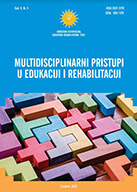IZVRŠNE FUNKCIJE KOD DJECE SA POTEŠKOĆAMA U RAZVOJU PREDŠKOLSKE DOBI
EXECUTIVE FUNCTIONS IN PRESCHOOL CHILDREN WITH DEVELOPMENTAL DIFFICULTIES
Author(s): Arnela PasalicSubject(s): Education, Psychology, Developmental Psychology
Published by: Udruženje defektologa, edukatora-rehabilitatora (STOL)
Keywords: executive functions; domains of development; socioeconomic development;
Summary/Abstract: Executive functions (EF) are purposeful, goal-directed activities. The developmental profile of a preschool child is created by assessment through five developmental areas: cognitive, communicative, socioemotional, physical and adaptive behavior. The aim of this research is to determine the impact of different components of EF on the developmental domains of preschool children with developmental disabilities (CDD) and compare them with children with neurotypical development (CND) and to examine the influence of the family’s socioeconomic status on the development of IF. Methods: The sample included 120 children from regular and specialized preschool institutions from Bosnia and Herzegovina. The children are five and six years old. Socioeconomic status was examined through parents professional education and the sample consists of CDD parents, 28 parents with higher vocational education (HVE) and 32 parents with secondary vocational education (SVE), and CND parents, 25 parents with HVE and 35 parents with SVE. Instruments: Children’s profiles were examined by Developmental Assessment of Young Children (DAYC-2, Swartmiller 2014) and executive functions by using the preschool version of the Behavior Rating Inventory of Executive Functions (BRIEF, Giola et al. al., 2003). Results: The obtained results indicate the existence of significantly lower statistical associations of IF with domains of development in DPR compared to TPR. In DPR there is a statistically significant association in favor of parents with VSS in the components: redirection (t=-2.53; p=0.01), emotional control (t=-2.46; p=0.01), and in DTR inhibition (t=2.26; p=0.02), emotional control (t=2.26; p=0.05) and working memory (t=2.51; p=0.01). Conclusion: Research shows a different relation between EF and developmental domains in CDD and CND. Children of higher socioeconomic status show a connection with more components of IF.
Journal: Multidisciplinarni Pristupi u Edukaciji i Rehabilitaciji
- Issue Year: 5/2023
- Issue No: 5
- Page Range: 49-69
- Page Count: 21
- Language: Bosnian

